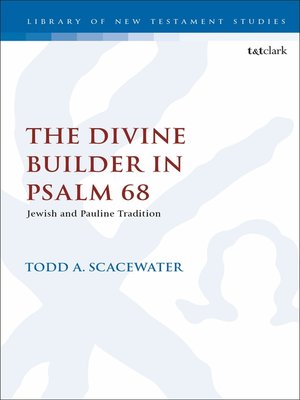The Divine Builder in Psalm 68
ebook ∣ Jewish and Pauline Tradition · The Library of New Testament Studies
By Todd A. Scacewater

Sign up to save your library
With an OverDrive account, you can save your favorite libraries for at-a-glance information about availability. Find out more about OverDrive accounts.
Find this title in Libby, the library reading app by OverDrive.



Search for a digital library with this title
Title found at these libraries:
| Library Name | Distance |
|---|---|
| Loading... |
The problem of Psalm 68:19 (Masoretic Text) in Ephesians 4:8 has a rich history of interpretation; particular focus has been placed on Jewish and Pauline interpretations of the psalm, and the Jewish exegetical tradition that reads Moses as the one who ascends Mount Sinai to receive and give the law. Todd Scacewater suggests a second tradition, henceforth unnoticed, that interprets Psalm 68 eschatologically. While both traditions are significant, Scacewater maintains that the eschatological tradition provides a better matrix through which to understand Paul's use of the psalm.
Scacewater argues that another key for understanding Pauline use of the psalm is the divine builder topos, which is pervasive in the ancient Near East, utilized in Psalm 68, and evident in Paul's understanding of the psalm as he applies it to Christ, the eschatological divine builder. Discussing the context of Ephesians, the building of the Temple and the trope of the divine builder, and Psalm 68's position in early/late Judaism and Ephesians, Scacewater contributes to a new methodology for studying how the New Testament authors interpreted and appropriated Hebrew Scriptures.
Scacewater argues that another key for understanding Pauline use of the psalm is the divine builder topos, which is pervasive in the ancient Near East, utilized in Psalm 68, and evident in Paul's understanding of the psalm as he applies it to Christ, the eschatological divine builder. Discussing the context of Ephesians, the building of the Temple and the trope of the divine builder, and Psalm 68's position in early/late Judaism and Ephesians, Scacewater contributes to a new methodology for studying how the New Testament authors interpreted and appropriated Hebrew Scriptures.







